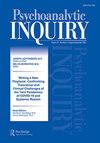Mimetic Understanding: The Embodied Dance of Words and Action
IF 0.5
4区 心理学
Q3 PSYCHOLOGY, PSYCHOANALYSIS
引用次数: 0
Abstract
ABSTRACTIn this article we emphasize that Greek tragedy, surprisingly, can prove to be close to current psychoanalytic practice in exploring the paradoxical dimension of subjectivity. The interweaving of explicit/implicit communication and unconscious dimension in psychoanalytic work gives rise to emergent moments of meaning. Tragedy and psychoanalysis find their value in always striving for truth, at times grasping it, only to lose it and to have to co-construct it all over again. In the figure/background articulation of the spoken, the unspoken, and the unspeakable, it is important to consider words not as labels fixed to define qualities and phenomena, but as living processes that go through exciting twists and turns. The words of therapy are spoken words and are part of a communicative flow that takes place in the interweaving of multiple implicit and explicit channels involving all the senses: voice quality, rhythm, sound, gaze, emotionally activated body. We have been interested in rhythm in the clinical exchange and we have delved into the study of imitation as the primary vehicle of implicit relational knowing and the transmission of pragmatic knowledge embodying ways of being in the world at very deep and procedural levels. A short vignette and a clinical case illustrate how the tool of mimesis proves useful in activating and improving our clinical sensitivity.KEYWORDS: MimesisGreek tragedyembodimentmultiplicityimplicit/explicit clinical process Disclosure statementNo potential conflict of interest was reported by the authors.Additional informationNotes on contributorsSusanna FedericiSusanna Federici, Ph.D., is founding member, Faculty, supervising and training analyst of ISIPSÉ (Institute for Self Psychology and Relational Psychoanalysis, Italy); President of IARPP (International Association for Relational Psychoanalysis and Psychotherapy); and Past Member International Council of IAPSP (International Association Psychoanalytic Self Psychology).Gianni NebbiosiGianni Nebbiosi, Ph.D., is President, founding member, supervising and training analyst, of ISIPSÉ (Institute for Self Psychology and Relational Psychoanalysis, Italy); Founding and Board Member of IARPP (International Association for Relational Psychoanalysis and Psychotherapy); Member International Council of IAPSP (International Association for Psychoanalytic Self Psychology); Member Editorial Board of the journal Psychoanalytic Dialogues; and Member Editorial Board of the journal Psychoanalytic Inquiry.拟态理解:语言和行动的具体化舞蹈
在本文中,我们强调希腊悲剧,令人惊讶的是,可以证明在探索主体性的矛盾维度方面接近当前的精神分析实践。在精神分析工作中,显性/隐性交流和无意识维度的交织产生了突现的意义时刻。悲剧和精神分析发现,它们的价值在于始终追求真理,有时抓住真理,结果却失去了真理,不得不重新构建真理。在口头、非口头和不可言说的形象/背景的清晰表达中,重要的是不要将单词视为定义质量和现象的固定标签,而是将其视为经历令人兴奋的曲折和转折的生活过程。治疗的话语是口头语言,是交流流程的一部分,它发生在多个隐含和明确的渠道交织中,涉及所有感官:语音质量、节奏、声音、凝视、情绪激活的身体。我们对临床交流中的节奏感兴趣我们深入研究了模仿作为内隐关系认知的主要载体和实用知识的传播体现了在非常深刻和程序性的层面上存在于世界的方式。一个简短的插图和一个临床案例说明了模仿的工具如何在激活和提高我们的临床敏感性方面证明是有用的。关键词:拟人、希腊悲剧、体现、多样性、内隐/外显临床过程披露声明作者未报告潜在利益冲突。苏珊娜·费德里希博士是ISIPSÉ(意大利自我心理学和关系精神分析研究所)的创始成员、教员、监督和培训分析师;IARPP(国际关系精神分析和心理治疗协会)主席;国际精神分析自我心理学协会(IAPSP)国际理事会前任成员。Gianni Nebbiosi,博士,ISIPSÉ(意大利自我心理学和关系精神分析研究所)的主席、创始成员、监督和培训分析师;IARPP(国际关系精神分析和心理治疗协会)创始人和董事会成员;国际精神分析自我心理学协会(IAPSP)国际理事会成员;《精神分析对话》杂志编委会成员;也是《精神分析探究》杂志的编辑委员会成员。
本文章由计算机程序翻译,如有差异,请以英文原文为准。
求助全文
约1分钟内获得全文
求助全文
来源期刊

Psychoanalytic Inquiry
PSYCHOLOGY, PSYCHOANALYSIS-
CiteScore
1.00
自引率
33.30%
发文量
65
期刊介绍:
Now published five times a year, Psychoanalytic Inquiry (PI) retains distinction in the world of clinical publishing as a genuinely monographic journal. By dedicating each issue to a single topic, PI achieves a depth of coverage unique to the journal format; by virtue of the topical focus of each issue, it functions as a monograph series covering the most timely issues - theoretical, clinical, developmental , and institutional - before the field. Recent issues, focusing on Unconscious Communication, OCD, Movement and and Body Experience in Exploratory Therapy, Objct Relations, and Motivation, have found an appreciative readership among analysts, psychiatrists, clinical psychologists and a broad range of scholars in the humanities.
 求助内容:
求助内容: 应助结果提醒方式:
应助结果提醒方式:


